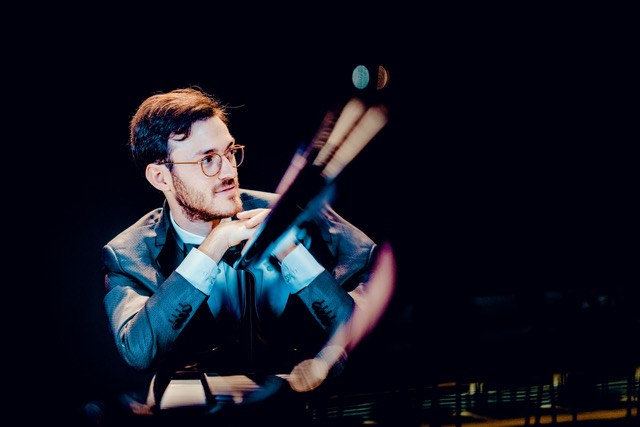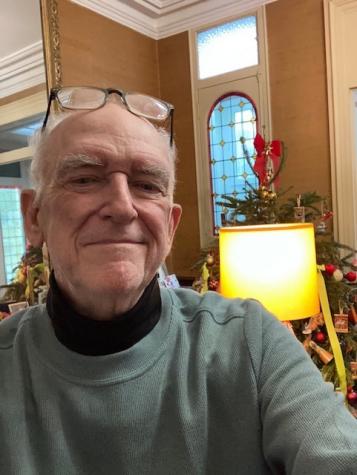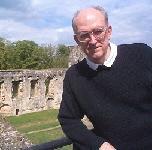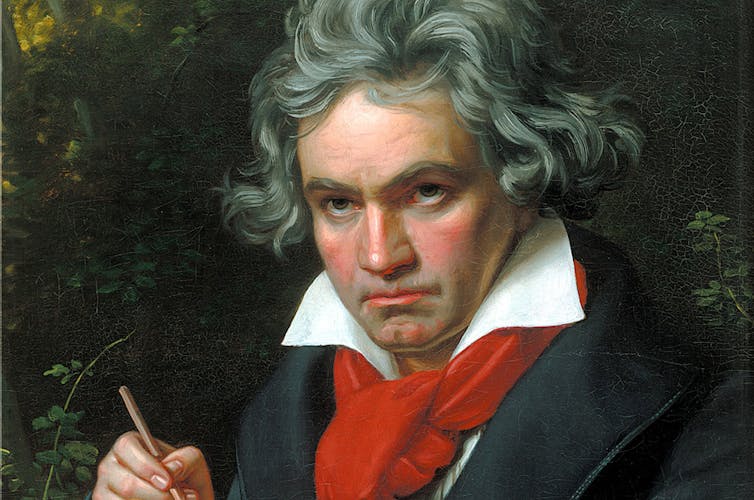Interview: Aris Blettenberg looks at open prospects in the world of music

Aris Alexander Blettenberg, the amiable, open-minded young pianist from Germany and Greece, won first prize at the International Beethoven Piano Competition recently in Vienna, playing Beethoven’s Piano Concerto No 1.
He was a popular choice for the cheering Viennese audience in the Golden Hall of the Vienna Musikverein. He won over the jury and the audience with his charm and emotional involvement in the music. First prize was 10,000 euros and a Bösendorfer Model 200 grand piano worth 105,000 euros, making it one of Europe’s leading competitions in prize winnings.
Where will he go from here? In a long interview, he made it clear he isn’t particular about how he will perform in the future – solo piano, ensemble playing or conducting. These are just different perspective on the same thing, he said.
Most important to him, he explained, is maintaining his individuality in interpretation. He feels it was a mistake in his past to pick and choose bits from different teachers and combine them into a finished performance. He has decided to create his own perspective, and “go for it”.
In this telephone interview, we discussed what the Beethoven competition meant to him and how he sees his future in the music world. Here is an edited transcript of our conversation.
When did you realize you had a future at the piano?
I had musical thoughts in mind at a very early age. I could not play any instrument at that stage.
Did it come unexpectedly?
Actually the piano was not my main interest at first but a turning point came when I started lessons with Lucie Samson, a teacher from Quebec, in Duisberg, Germany. She encouraged me to study piano.
Was your home very musical? Does everyone play an instrument.
No, my family has a long tradition of producing medical doctors but I was never interested in becoming a doctor. Why not? They are almost never home and when they are they bring their work into their private life. They cannot leave it at the hospital. At family dinners they talked abut cancer! So I tried to find a different way forward and I finally found it. In music, I had my own little world.
Did you end a black sheep, a disappointment to the family?
Oh no. They left me alone continue on my way. They wanted to see if the piano was just going to be a hobby, or what. They were quite surprised that I kept at it, and decided to support me.
What did you play at your first public appearance at the piano?
At age about 11, I played a waltz by Johann Strauss. I was very interested in him -- I still am.
You are still a student ?
Yes, I study with Lars Vogt in Hannover, and I study chamber music in Munich. I actually prefer chamber music. Even performing a sonata is kind of chamber music. I take a chamber music approach. I have composed a piano trio.
Can you name a teacher who transformed you?
Yes, I studied with Antti Siirala for six years and learned so much from him.
What has he helped you with?
He definitely improved my technical skills, an important element because they are also musical skills. So he improved my musical expression by improving my technique. I am still learning from him without being his student any more. He always teaches how to have a certain flow, an overall arc of a piece. I’m very grateful. He was such as important step in my musical career.
Six years? Sounds like a long time, probably a pivotal period?
Yes, I pondered where I could go after Antti – I couldn’t top what he gave me. Then I found Lars Vogt and I thought, well, this could be very interesting. He is pianist and also a much sought-after conductor. He combined these two passions of mine. I think I was right.
Did you have any help getting ready for the competition?
Not really. I prepared all the repertoire myself. I wanted it to be my thing, so I could be very authentic, not just playing the thoughts of others. I was not striving for success, or to be the first prize candidate.
You looked supremely confident, so much at home.
I wanted to avoid getting so much help that I didn’t know myself any more. Before, I was losing my personal touch. You know, one measure from one teacher, one from another -- a mix of different views and interpretations. I realized this was a mistake and I had to change.
You came to the conclusion on your own, alone?
Yes, after a long period after a lot of bad experiences, but we all know bad experiences are the best way to learn.
Describe the competition experience.
I had a certain feeling that all things were falling into place, everything was turning out consistent and coherent. It felt so right. I was so “in the moment”. I enjoyed every bit of it. After my performance I just wanted to continue playing, it was so enjoyable.
How important is Beethoven in your repertoire?
I am really into German composers and since winning the competition Beethoven will get more interesting and important to me. For example I want to do the complete 32 sonatas. I have several other plans in the next few years. But I am very open to all music.
Is it a lifetime project to master the so-called 32?
I still have a lot of time.
Wasn’t all this Beethoven somewhat limiting -- a temporary distraction from your broad interests?
Kind of, but not really in any negative sense. It was not two years of pure Beethoven. The competition was postponed from last year because of the pandemic so all the candidates had time to work on their pieces and learn the music more deeply. I tried not to focus too much on him. You can get stiff, too stuck into it if you over-concentrate on him or any composer. It’s helpful to leave some compositions alone for a while and let them rest, and then pick them up again and find a more mature approach.
Don’t you find Beethoven’s influence in other music from his era and afterward?
Definitely. I have learned a lot about Beethoven by playing other composers. You see how he influenced them. You can do this by playing Schubert, for example, because you see the Beethoven parts in Schubert and you think “Wow – that’s him again.” So it’s always very important to continue playing your broader repertoire.
You have expanded your music life to conducting, haven’t you?
Yes, I began with my opera debut at the Statsopera of Meiningin, where Hans von Bülow was conductor. I have also conducted from the keyboard, for example the Saint Saens second piano concerto and the Shostakovich second as well. I did the Gershwin Rhapsody in Blue, lot of Beethoven, plus some of my own compositions.
Rudolf Buchbinder, with whom you have studied in masterclasses, says he loves conducting from the keyboard.
Yes, and so do I. Playing with an orchestra, time flies by so fast. You come out onstage and you have all these players around you and supporting you.
Are you going to drop the piano and go into conducting?
I don’t really know. Music is so universal. It doesn’t much matter to me in what way I am going to be involved in music. For me it’s the same playing a sonata, with an ensemble or conducting a symphony. It’s just another perspective of the same thing.
How does your musical memory work? Everyone is a bit different. Do visualize the score? Does the music itself carry you forward?
I am lucky to be a fast learner. My sight-reading is quite good, if I may say so. But I normally first learn a piece by heart by memorizing the score -- before playing a single note of it. I learned the first book of Well Tempered Clavier this way. I learned all the preludes one by one, by heart, just reading and memorizine it. Then I went to the keyboard and tried to hit the right keys.
Do you listen recordings?
No, I haven’t listened to any recordings of my repertory. You get lost your authenticity, your original thoughts, even unconsciously. I want to have my own view and then go for it. I don’t want to get distracted by recordings.
Surely you have favorite pianists that you revere?
Yes of course. There is Arthur Rubinstein. I love his calm nobility, even his posture. I admire pianists who can sit there calmly and give all their feelings and emotions without distracting us with too much movement.
Where do you see your career evolving internationally?
German-speaking countries and Europe are my base. I have not played yet in the United States or Asia. Is it really necessary that every pianist should have a worldwide career? I am a bit against it. I think. We should concentrate more on our local obligations. It is my duty to play for the people in my region -- to be there for them. For example, I don’t see the advantage of every little German orchestra traveling around Asia. It’s such a waste of resources. Everything gets so interchangeable. There is no local color any more.
You have Greek ancestry. Will you be playing in Greece?
I have the dream of playing “The 32” in my home town of Kalamatra in the south of Greece. But classical music is not part of the central cultural discussion and tradition there. It’s more a Western thing. I don’t think anything like “The 32” has been offered before. There’s so much to do there. I can see myself establishing something like a festival or teaching or playing concerts, somehow bringing classical music to the Greek people. Greece is an open field. You could do so many new things there. This is what attracts me.
END
This article is brought to you by the author who owns the copyright to the text.
Should you want to support the author’s creative work you can use the PayPal “Donate” button below.
Your donation is a transaction between you and the author. The proceeds go directly to the author’s PayPal account in full less PayPal’s commission.
Facts & Arts neither receives information about you, nor of your donation, nor does Facts & Arts receive a commission.
Facts & Arts does not pay the author, nor takes paid by the author, for the posting of the author's material on Facts & Arts. Facts & Arts finances its operations by selling advertising space.




















